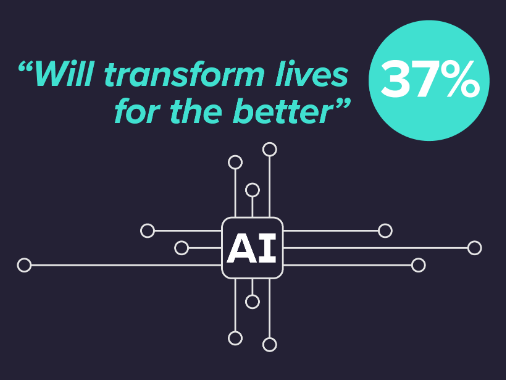09/04/2025
Who’s afraid of AI?: What UK industries really think about artificial intelligence
We’re all aware of the hype. AI is going to revolutionise everything from our shopping baskets to our GP appointments. But while some industries are rolling out the red carpet for AI, others are giving it a wide berth.
To dig deeper, we ran a nationwide survey of over 2,000 professionals across the UK to find out which sectors are embracing AI’s potential, and which are still feeling sceptical.
Here’s what we found:
While 37% of respondents said they believe AI will improve lives, the majority, 53%, think the risks outweigh the benefits.
The industries feeling good about AI

We weren’t surprised to find that sectors already steeped in digital innovation are the most positive about AI. Retail, IT, media, and energy workers are the ones most likely to see AI as a powerful tool rather than a threat.
Here’s what we found:
- Retail: Only 12% of businesses in the sector have adopted AI so far, but a massive 85% believe it will transform their industry. And we can see why. AI is already helping with hyper-personalised recommendations, demand forecasting, and automated customer service.
- IT and media: These sectors are leaning into AI’s capabilities, with 39% and 30% positivity rates respectively. Whether it's automated code testing or AI-generated content, professionals here are seeing the upsides in action.
- Energy: With 42% of respondents seeing AI as a positive, this sector is tapping into AI for everything from smart grid optimisation to predictive maintenance and sustainability efforts.
As our founder, Andy Brown, put it:
“AI-driven personalisation in retail, automation in IT, and media advancements like AI-generated content are reshaping these industries. Meanwhile, the energy sector is leveraging AI for smarter grid management and sustainability efforts. Those who work with AI daily tend to be more optimistic about its potential.”
The sectors feeling nervous about AI
On the other side of the fence, there are sectors with legitimate concerns and some solid reasons to feel cautious. The finance, healthcare, and creative industries were the most sceptical of AI’s rise.
Finance:
A full 59% of finance professionals expressed concern. Job automation, opaque algorithms, and the risk of AI making errors in fraud detection or high-stakes decision-making are real worries.
Healthcare:
57% of respondents said they were uneasy. AI’s potential for diagnostics and patient care is huge, but so are the risks if something goes wrong. Concerns around data privacy, accuracy, and ethics are top of mind.
Creative industries:
With 61% negative responses, creatives are the most cautious of all, with concerns about originality, ownership, and creative livelihoods.
The undecideds
Interestingly, 10% of professionals sat on the fence. Sectors like education, agriculture, and hospitality are still figuring out where AI fits and whether it’s worth the investment. This is where clearer use cases, ethical safeguards, and access to affordable tools could make all the difference.
So what’s the answer?
Despite the division, one thing came through loud and clear: nearly all sectors recognise that software plays a crucial role in making AI work. But it’s not about off-the-shelf solutions, it’s about bespoke software that’s shaped around the needs, regulations, and goals of each specific industry.
The key takeaway?
AI doesn’t need to be scary, it needs to be smart, responsible, and strategic.
We believe the real challenge isn’t the AI itself. It’s making sure businesses have the right foundations, tools, and support to implement it in a way that enhances - not replaces - human expertise.
What needs to happen next?
For AI adoption to accelerate (and fears to ease), a few things need to happen:
- Invest in workforce upskilling so teams understand and trust the tech
- Build ethical frameworks that protect privacy, creativity, and accountability
- Prioritise sector-specific solutions, not one-size-fits-all platforms
Develop and maintain tailored software that can evolve with your business
Public Sentiment on AI
Beyond industry perspectives, public opinion also reflects caution. A Forbes Advisor survey found that 59% of Brits have concerns about AI, particularly regarding:
- Dependence on AI and loss of human skills: 42% worry about an over-reliance on technology.
- Autonomous decision-making: 39% are uneasy about AI systems making decisions without human intervention.
Job displacement: Another 39% fear the impact on employment opportunities.
Bridging the AI confidence gap
Understanding these varied sentiments is crucial for businesses aiming to implement AI solutions. By addressing specific industry concerns and demonstrating tangible benefits, we can foster a more balanced and informed perspective on AI's role in the UK's professional landscape. Discover more about Propel Tech’s AI consultancy services here.
